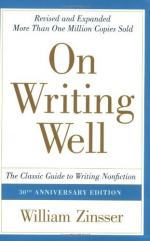|
This section contains 396 words (approx. 1 page at 400 words per page) |

|
Part III: Chapter 18 Writing About the Arts: Critics and Columnists Summary
A writer who wants to be a critic must become knowledgeable in the subject area, whether it is popular fiction, the theater, cinema, dance, or music. This is a requirement for writing good criticism, although many bad critics do appear in print.
The opportunity for great creative writing is in criticism of the arts. Zinsser gives several examples where good critics wrote memorable pieces, and illustrates with one wherein the critic writes better than the subject author. As with all forms of writing, the basic rules apply to criticism, but the demands of good criticism also lead to a higher level of literary ability. This becomes true when writing about dance or music. The reader cannot see the dance or hear the music, so other...
(read more from the Part III: Chapter 18 Writing About the Arts: Critics and Columnists Summary)
|
This section contains 396 words (approx. 1 page at 400 words per page) |

|




